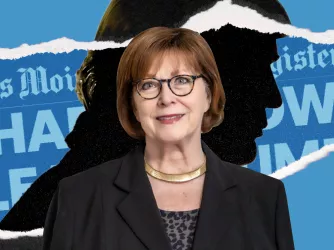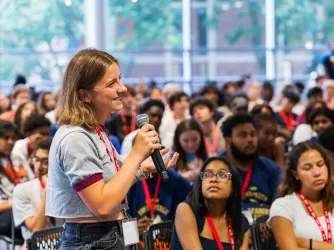Table of Contents
Unprincipled Hypocrisy Drives UMass to Do the Right Thing--This Time
Yesterday, FIRE's Will Creeley brought you the story of University of Massachusetts Amherst's capitulation to political pressure from Governor Deval Patrick and various police groups by canceling a planned speech on campus by convicted terror bomber Raymond Luc Levasseur. Well, get ready to suffer some whiplash—according to the Boston Herald, it's apparently back on. According to the Herald:
Now UMass officials say anti-censorship rules leave them no choice but to let Levasseur speak, even in a campus building.
"I am opposed to convicted terrorist Raymond Luc Levasseur speaking at the University of Massachusetts," college President Jack Wilson said. "The University of Massachusetts stands squarely against the outrageous actions he has committed in the past. As a university, we defend the principles of free speech and of academic freedom. However, we deplore the example Levasseur sets for our students and the University community." [Emphasis added.]
Don't get me wrong—this is a good development. As Will wrote yesterday: "Whatever one's opinion of Levasseur ... our nation's public universities must be open for speech of all kinds—however controversial and however offensive to some, most, or even all—if they are to serve the classical purpose of universities." Wilson's words reflect a recognition of this principle.
Unfortunately, under Wilson's leadership, UMass itself has shown no such commitment to the principles of free speech and academic freedom. Instead, what UMass has persistently displayed is an appalling double standard through which controversial views on the "left" side of the political spectrum are defended as free speech while controversial views on the "right" are censored and punished either directly or through a variety of disgraceful artifices.
Let's start by going back five years, although we could easily start earlier. In 2004, Patrick Higgins was a candidate for student government president. Part of his platform included opposition to a program that would mandate that the student legislature set aside a number of seats reserved only for members of the campus umbrella group for minorities. Higgins didn't like the fact that based on their race, some students would not be eligible for some of the seats in the student government at a publicly funded university. For his opposition to the set-asides, Higgins was branded a racist by his opponents. On election night, Higgins' supporters gathered in a room on campus and, in a parody of the accusations of racism, drew a caricature of Higgins as the Grand Wizard of the Ku Klux Klan on the whiteboard:
The reaction from administrators was swift. As we reported on October 15, 2004:
After controversy erupted, UMass Amherst Vice Chancellor for Student Affairs Michael Gargano told the Daily Collegian campus newspaper, "I have the authority to remove these people from office ... I could give them 500 hours of community service, have them conduct an open forum discussion; I have a variety of sanctions at my disposal. I'm not ruling out dismissal." Gargano further articulated his threats at a September 27 "diversity panel," stating, "[I]f the Student Government Association doesn't move on it, I will. Are we clear? Resign!"
The same "diversity panel," consisting of Gargano, SGA President Eduardo Bustamante, and several UMass faculty members, labeled the nine students in the photos the "KKK Nine," implying that they supported the Ku Klux Klan ....
In the same press release, we contrasted this threat of expulsion for a whiteboard parody to another free speech controversy that was occurring at nearly the same time at UMass:
UMass's actions in this case stand in stark contrast to its treatment of Rene Gonzalez, a UMass graduate student who wrote an article for the Daily Collegian last spring that called NFL player turned Army Ranger Pat Tillman [who died by friendly fire] an "idiot" and said that "this was a 'G.I. Joe' guy who got what was coming to him." UMass rightly refused to take official action against Gonzalez. Instead, UMass system President Jack Wilson responded, "While I recognize Rene Gonzalez's right of free speech, I must also assert my right of free speech to criticize what he said."
Got that? Making fun of what you see as false accusations of racism is unacceptable and should be punished. Making fun of the death of an American soldier is wrong but must be tolerated as free speech.
UMass stormed back onto the censorship scene this year with not one but two examples of its tolerance of those who would silence others with "conservative" views. In the spring, a UMass student stood on a stack of stolen copies of the campus conservative newspaper The Minuteman so that others could not read them. Then, a UMass police officer stood by while the student stole dozens of copies of the paper out of the hands of another student intending to distribute it. Despite the fact that her acts were captured on video and in a photo, UMass refused to do anything about her vigilante censorship. Only after FIRE put on the pressure did UMass respond, but it did so in the weakest way possible: a "reprimand" of the student thief. So at UMass, a whiteboard caricature of oneself prompts administrators to talk about explusion, while a blatant theft on tape results in a grudging reprimand. What's the deciding factor? The politics of the person speaking, of course!
But wait! There's more! In probably the most direct parallel to the current Levasseur situation, conservative columnist Don Feder was invited to speak on campus. When "left-wing" students threatened to protest, UMass' reaction was to decide to charge Feder's hosts, the Republican Club, nearly three times as much in security costs because of the threatened disruption. Not only is this unconstitutional, it's blatantly unfair because it means that the more violent the threatened protest against you, the more you have to pay to protect yourself. This guts the point of the First Amendment, which is to protect those with less popular views. Yet again, until FIRE intervened and applied public pressure, the university stuck to its line. I hardly need mention that despite the increased security costs, Feder's speech was repeatedly interrupted by unruly students whom UMass police did nothing to stop, leading Feder to give up trying to speak after half an hour. One can only hope the police security will be more effective at Levasseur's speech, but something tells me it just might be.
It is no secret that academia is dominated by the "left," and that is undoubtedly why UMass has chosen to marginalize those we generally see as being on the "right." But while any large group of like-minded people in one place creates a risk of a tendency towards "groupthink," it is hardly beyond the power of anyone rational (on the left or the right) to understand that speech is only free when all parties are free to have their say without censorship from the authorities or from self-appointed vigilantes. Hence the UMass administration's cartoonish double standards are simply unforgivable and reflect a deliberate abdication of responsibility and principle, both as officers of an academic institution and as public servants.
UMass therefore deserves all the hassle it is getting from the governor, police groups, and others over its decision to invite, uninvite, and then reinvite Ray Luc Levasseur. If UMass had stuck to the (constitutionally mandated) principle of free speech for all speakers on campus, it would have a believable argument with which to fight back against those who would impoverish campus discourse for political reasons. As it stands, though, UMass is on its own. It might be gratifying for a while to silence those whom you oppose politically, but as with so many things in life, what goes around eventually comes around.
Recent Articles
FIRE’s award-winning Newsdesk covers the free speech news you need to stay informed.

FIRE’s defense of pollster J. Ann Selzer against Donald Trump’s lawsuit is First Amendment 101

Cosmetologists can’t shoot a gun? FIRE ‘blasts’ tech college for punishing student over target practice video

China’s censorship goes global — from secret police stations to video games
